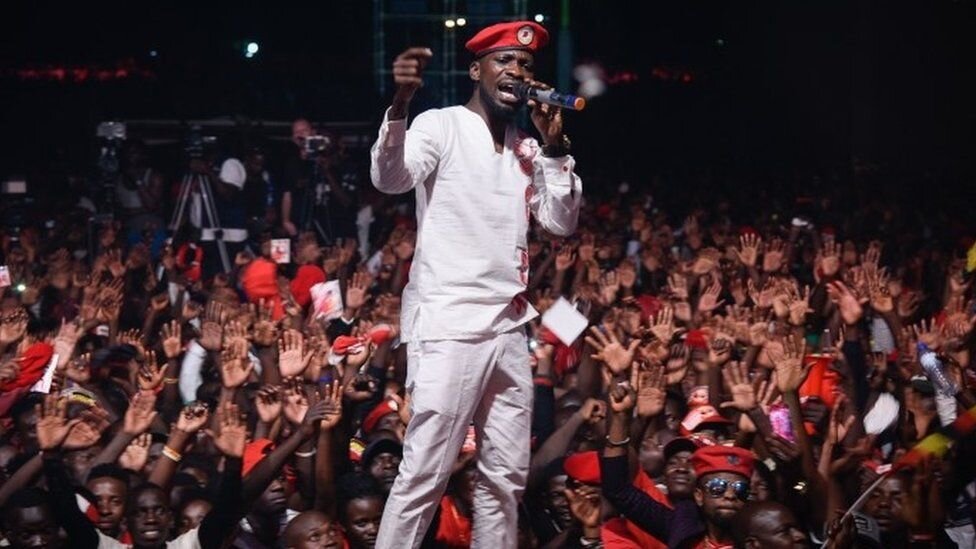Bobi Wine performs for the first time after being released from jail in November 2018 © AFP
I met a girl who sang the blues
And I asked her for some happy news
But she just smiled and turned away
I went down to the sacred store
Where I’d heard the music years before
But the man there said the music wouldn’t play
And in the streets: the children screamed
The lovers cried, and the poets dreamed
But not a word was spoken;
The church bells all were broken
And the three men I admire most:
The Father, Son, and the Holy Ghost
They caught the last train for the coast
The day the music died
American Pie, Don McLean, 1971
In his famous ballad, American Pie, Don McLean cried that “something touched (him) deep inside, the day the music died.” In writing this American cultural touchstone, McLean’s tribute to the death of his friends Buddy Holly, The Big Bopper and Ritchie Valens in a plane crash in 1959 may as well have been an allegory of the death of American culture. Innocence was lost on the day the music died.
In the past year, the music has died on the streets of Arua, in the courtrooms of Gulu and in the music venues of Kampala. President Museveni of Uganda and his crew of thugs have finally been exposed for the abuse and torture they’ve levelled against those lawfully and peacefully criticising the government. Most prominently, Mr. Museveni has banned several concerts of one of his most popular critics, Bobi Wine, the successful musical artist turned member of parliament. Mr. Museveni mobilised security forces to ban entrance to the planned music venues, and ordered the use of violence on peaceful protestors and supporters of Mr. Wine.
Due to the public outrage at this capricious and extrajudicial trampling on Bobi’s fair right to freedom of expression, Museveni is now considering passing a law which would require any musical artist to seek permission of the government for the release of a record, or to host a performance. Such a law would have a tremendous chilling effect on freedom of expression. This, of course, followed the arrest, imprisonment and torture of Mr. Wine in what has now become a series of acts designed to intimidate and suppress an opponent who is deeply popular with a new generation of Ugandans.
Freedom of expression and of the media is guaranteed by Article 19 of the International Covenant on Civil and Political Rights, as well as Article 9 of the African Charter on Human and Peoples’ Rights. At a national level in Uganda, the Press and Journalist Act of 1995 ensures the freedom of the press. Further, Article 29 of the Ugandan Constitution provides that “every person shall have the right to freedom of speech and expression, which shall include freedom of the press and other media”.
Despite this, Mr. Museveni has prepared and intends to pass new draft regulations under the Stage Plays & Public Entertainments Act, Cap 49. These regulations are expected to be passed in March of this year. The new regulations include a requirement for artists to submit their products — such as song lyrics or film scripts — to authorities for a vetting process. In addition, artists will be required to register and obtain a licence, which the authorities can revoke for failure to comply with the new regulations, thereby increasing the restriction on the free speech of artists.
Effectively, these regulations will impose a censorship regime and constitute a serious infringement upon freedom of expression. It is patently clear that the regulations are specifically aimed at intimidating artists voicing critical opinions about the government. This is a cynical move by the government, first for the very principle that infringing against such free speech is a denial of a basic human right, but practically because Museveni knows that recording artists make the majority of their money through live performances.
In the case of Bobi Wine, Museveni knows that if he prevents him from making money through his concerts, then he will have less in his ‘election war chest’ come the next presidential election in 2021. It is a direct and outrageous infringement on the right to freedom of expression with a clear political objective in mind.
This is not the first time Museveni has made an attack on free speech. In 2017, the government introduced a social media tax whereby social media users must pay a daily fee in order to use apps like WhatsApp, Facebook and Skype. Museveni urged his finance minister to introduce this tax as a way to deal with the consequences of, as he put it, online “gossip”.
Prominent Ugandan voices wasted no time pointing out Museveni’s hypocrisy and true motives in implementing his social media tax.
It is known that young Ugandans, who incidentally make up the majority of Uganda’s population, use social media to campaign. The country’s youth are among the most adept at online organizing. Bobi’s success as a politician was accordingly derived from his online campaign. Museveni is fearful of any threat to his 33-year rule and will clearly go to any lengths to silence his people.
Museveni does not discriminate between opposition politicians, journalists or his citizens. All Ugandans are subject to abuse if they speak out against him. State regulator Uganda Media Centre scans social media websites for posts criticising the Ugandan government. Moreover, the independent research network Afrobarometer indicates that the freedom of the political opposition in Uganda is shrinking, and that opposition parties increasingly have less freedom to speak or hold rallies, state their views or criticise the government.
Freedom House also emphasises the restriction on free speech in the context of media, with journalists regularly being arrested and beaten by state officials. The government even went so far as to ban reporting on opposition activities and threatened journalists with arrest or cancellation of licences. Arrests of journalists have been highly condemned by international organisations and NGOs, who have called on the Ugandan authorities to cease their intimidation campaign against the press. One such incident was the arrest and beating of two journalists who were filming the killing of Bobi Wine’s driver.
The severity with which the Ugandan government is restricting the press cannot be overlooked. In a democratic society, the press takes up the main role of informing the citizens and thereby holding government accountable. Under the conditions created by the Ugandan government for the press, this accountability mechanism is heavily endangered.
Museveni and his government also use court processes to intimidate opponents in the hope they will no longer voice their opposing opinions. This, of course, occurred in the case of Bobi Wine, but many of his other supporters were arrested for the same ‘crime’, in addition to other prominent opposition figures such as Kizza Besigye and Michael Kabaziguruka.
This creep on the universal right to freedom of expression has now entered the musical arena, and it is incumbent on the international community to ensure that the music doesn’t die. Encouragingly, the UK Secretary of State for Foreign and Commonwealth Affairs issued a statement at the end of January cautioning against the proposed regulations:
“We are aware of the proposed regulations to the Ugandan music and entertainment industry that are currently being consulted on and are yet to be approved by the Cabinet. The UK’s position is that such regulations must not be used as a means of censorship. The UK supports freedom of expression as a fundamental human right and, alongside freedom of the media, maintains that it is an essential quality of any functioning democracy. We continue to raise any concerns around civic and political issues directly with the Ugandan government.”
The world is watching, and we must continue to do so. Law by law, abuse by abuse, Museveni and his gang of thugs must be called out. And perhaps sitting quietly at his desk at State House, the President might sing to himself:
“Do you recall what was revealed
The day the music died?”


